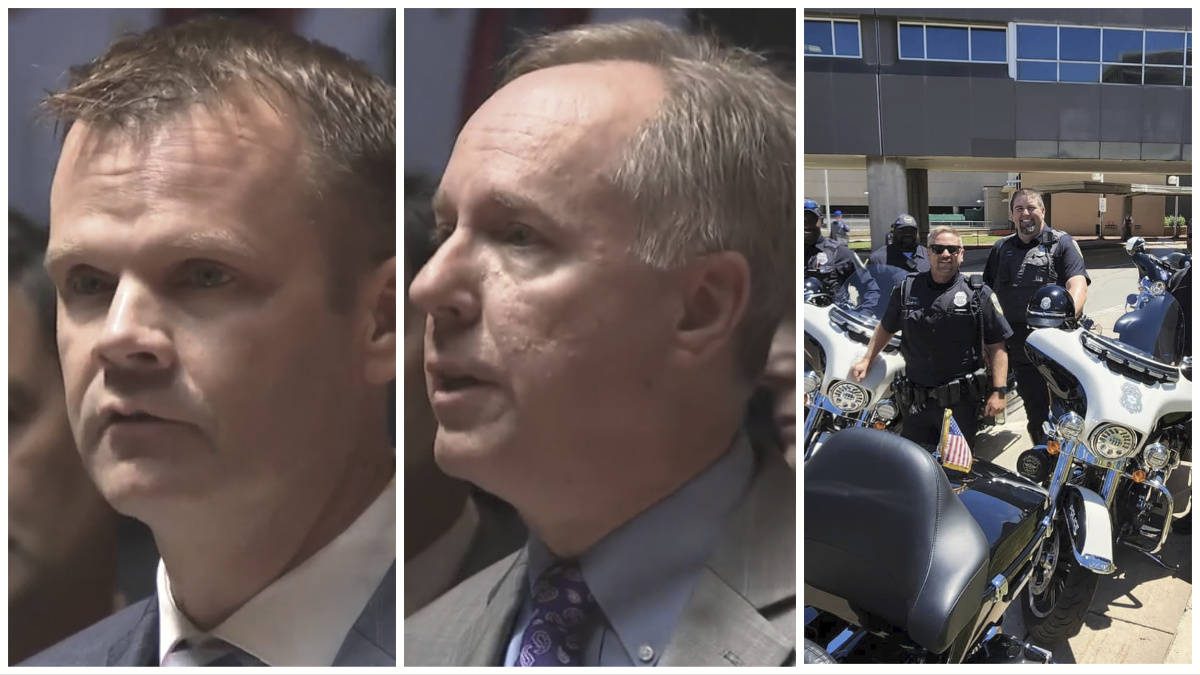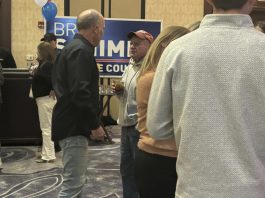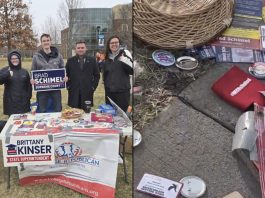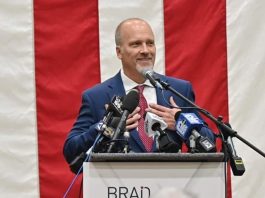Republican leaders Robin Vos and Devin LeMahieu announced on Thursday that they have reached a historic Wisconsin shared revenue deal with Democratic Gov. Tony Evers, no easy feat in the state’s bitterly divided government.
The bill accomplishes some major, long-held goals of conservatives, stopping the defunding the police movement, expanding school choice aid, putting cops back in Milwaukee schools, preventing tax dollars from funding the street car, and repealing the onerous personal property tax to help small business, for starters.
Milwaukee officials got one very big thing they wanted: The ability to have elected representatives (the Common Council and County Board) approve a sales tax increase to fix the city and county’s massive unfunded pension liabilities. Vos had previously insisted on a referendum. The City of Milwaukee will now be able to raise its sales tax by 2%. Milwaukee County will be able to raise its sales tax by .4% not .375%, if legislators in Vos’s and LeMahieu’s chambers follow their lead. The other options were worse, though; Milwaukee bankruptcy or massive cuts in services, such as 500 cops).
Republican leaders also agreed to increase shared revenue to local governments with fewer than 110,000 people from 15 to 20%, LeMahieu said. Obviously, that will help conservative areas of the state. The shared revenue formula was broken, most experts agree, stressing local governments from being able to provide core services as Biden-inflation soared. The increases are coming from a portion of the state sales tax that Wisconsin already collects.
In addition to the other conservative wins, and this is a big one, the deal directs that the shared revenue increases in all state communities go to fund local law enforcement, fire, EMS, public works, and transportation – core services, Republican leaders said. In other words, locals can’t fritter the money away on fluff.
Evers said in a statement, “I’ve reached a tentative agreement with GOP leaders on a historic increase in shared revenue to support communities of every size statewide, contingent upon a historic investment in K-12 schools and education.” In truth, Milwaukee had so mismanaged its finances and pension system that Evers really had limited leverage here.
Here are 13 wins for conservatives that were baked into the bill. In a news conference, Vos called them “conservative wins with things we struggled to get over the finish line before.” He added that the state was giving “Milwaukee the opportunity to correct years of mismanagement.”
1. Wisconsin Shared Revenue Deal: School Choice Aid Increase
WIN! Voucher and charter schools get a huge bump in Wisconsin.
Up to 40% increase in choice and charter enrollments coming.
Thanks to leadership including @repvos @SenatorDevin @RepDittrich https://t.co/Al5JfrDEy1— Dan Lennington (@DanLennington) June 8, 2023
Vos said in a news conference that he changed his mind on the referendum requirement because of the school choice expansion. He said there is a chance, based on estimates by school choice folks, that “we are looking at upwards of a 40% increase of the number of kids who will be able to be in a choice school.” He said Republican leaders “traded away” the referendum for that.
Vos called the shared revenue deal “transformational,” and he said it would mark the “largest expansion of school choice since the program was originally founded.” At the same time, Vos said, the plan delivers more money for public schools.
LeMahieu also touted the school choice changes, saying that the plan “invests heavily in school choice” while also being the “biggest investment in public education ever.”
Evers acknowledged that the plan provides a “per pupil aid increase for choice and independent charter schools.” Vos said that, under the new formula, private choice K-8 schools will get $9,500 per pupil, charter schools $11,000 and high schools $12,000, still less than the amount spent in any public school.
In addition, he said the deal increases the reimbursement rate for special education and puts $50 million into a literacy program.
2. Repeal of the Personal Property Tax
The bill repeals the personal property tax for everyone in the state. This has been a particularly onerous tax for small businesses.
3. Preventing the Milwaukee Police Department From Being Defunded
According to state Rep. Tony Kurtz, a Republican, the city must maintain a strength of 1,725 sworn officers on the Milwaukee Police Department. We previously reported that the number of sworn MPD officers had dropped more than 18% since the mid-1990s as homicide soars.
In addition, 218 firefighters will be added to get the Fire Department’s strength to “proper levels,” he said.
4. Preserving the Detective Bureau
The MPD used to boast some of the best clearance rates in the country, but it has struggled with depleted staffing levels. Kurtz said the shared revenue deal means that the guaranteed 1,725 sworn MPD officers must include 175 detectives.
5. Shifting Power From the Civilian Fire & Police Commission to the Police Chief
The uniquely powerful civilians on the Milwaukee Fire and Police Commission have long been a thorn in the sides of police chiefs.
The shared revenue deal means that the police chief “will now be making policy, not the unelected people on the Police and Fire Commission,” said Kurtz. It should be noted that the commission has been so extreme in recent years that one member advocated for abolishing the police.
6. Help for Courts & the Jail
Court backlogs, driven in part by bad COVID policy decisions from local officials, have imperiled public safety in Milwaukee County.
According to Kurtz, the deal “directs the county to help with the county courts,” as well as with correctional officers in the jail (where they are 90 short). It also helps the medical examiner’s office and a facility for children.
7. 25 School Resource Officers Will Be Deployed in the Milwaukee Public School System
State Rep. Barb Dittrich, who spoke at the news conference, said the deal requires that MPS “put 25 school resource officers at their schools across the district,” noting that “these SROs create relationships with the kids.”
She said that the plan also requires school districts to track crimes that occur on school grounds during school sanctioned events and to create a school accountability report.
8. No Tax Dollars for the Street Car
Milwaukee officials are barred from using tax levy dollars to expand the street car.
9. Local Public Health Official Restrictions on Closing Businesses
Republican legislators said the bill prevents local public health officials from closing down businesses for an extended period of time and deeming them essential or not.
10. No DEI
Vos said that the deal ensures “no DEI will be funded around the state,” referring to diversity, equity and inclusivity positions.
11. Requiring a 2/3rds Vote for New Spending or Positions
Milwaukee will have to have a 2/3rds vote to have any new net spending or to create net new positions under the plan.
12. Limiting How the Sales Tax Revenue Can Be Spent
Rep. Tony Kurtz, a Republican, said in the news conference that the city sales tax, if approved, would generate $184 million annually, and the county sales tax would generate $76 million.
However, “these funds must…be used to address their unfunded pension liability and to maintain and grow their law enforcement, fire protection and emergency services,” Kurtz said. In other words, the city can’t fritter away the new revenue on nonsense.
13. Moving New City & County Workers Into the State Pension System
City and county pensions have long been more lucrative than those in the state pension system, and they’ve long been a bane for taxpayers (recall: the county pension scandal and Tom Ament recall.)
“We will have a soft close of the current pension system for city and county,” Kurtz said. “All new hires will come on to the Wisconsin retirement system, which was voted the best in the country.”
Is there support for the deal in the full Senate and Assembly? LeMahieu said he hadn’t had a chance to talk individually with all of his members, but he predicted that rural lawmakers would be hard-pressed to vote against a plan that helps so many of their communities.
Vos admitted there was “some heartburn” among Assembly Republicans over getting rid of the referendum requirement, but he believes he will get the votes because there are “enough conservative wins.”
Table of Contents







![WATCH: Elon Musk Town Hall Rally in Green Bay [FULL Video]](https://www.wisconsinrightnow.com/wp-content/uploads/2022/04/Elon_Musk_3018710552-265x198.jpg)



![The Great American Company [Up Against the Wall]](https://www.wisconsinrightnow.com/wp-content/uploads/2025/03/MixCollage-29-Mar-2025-09-08-PM-4504-265x198.jpg)
![The Wisconsin DOJ’s ‘Unlawful’ Lawman [WRN Voices] josh kaul](https://www.wisconsinrightnow.com/wp-content/uploads/2025/03/MixCollage-29-Mar-2025-08-48-PM-2468-265x198.jpg)